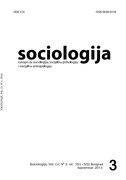Model efikasne nadnice
Efficiency-Wage Model
Author(s): Nikola FabrisSubject(s): Social Sciences
Published by: Sociološko naučno društvo Srbije
Keywords: labour market; efficiency wage model; unemployment; sociology of work
Summary/Abstract: In classical theory, the labour market operates as any other market, that is, the supply and demand determines the equilibrium between wages and the number of employees. The Keynesians went a step further by pointing out that the labour market does not follow the same principle as other markets and that wages do not change due to numerous rigidities, i.e. that the equilibrium is not achieved with full employment. The neoclassical macroeconomics reverts to the classical theory, noting that the labour market equilibrium is achieved immediately. The weakness of these theories is that they do not sufficiently consider specific features of the labour market and/or human labour. However, the new Keynesians went a step further in this direction by developing the efficiency wage model incorporating both economic and sociological explanations in the labour market interpretation. Nevertheless, it seems that there is still enough room for further improvements of this model and the paper communicates certain suggestions to that end
Journal: Sociologija
- Issue Year: 55/2013
- Issue No: 3
- Page Range: 461-474
- Page Count: 3
- Language: Serbian

